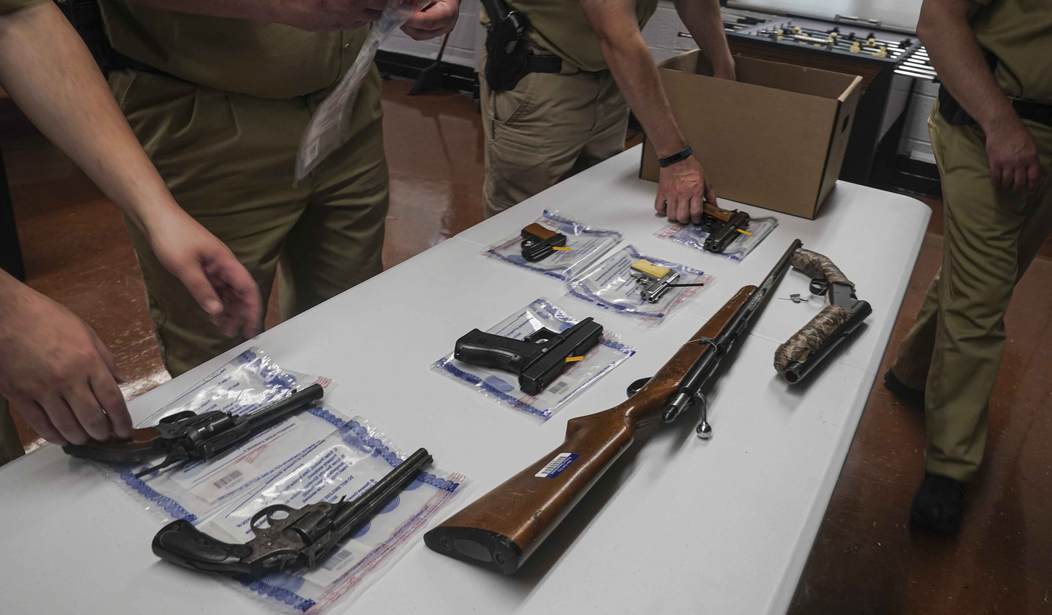If you’re a regular reader here at Bearing Arms, you’re well aware by now that gun “buyback” programs are more about public relations than public safety, and a recent compensated confiscation event in Raleigh, North Carolina exquisitely proves that point. While Raleigh Mayor Mary-Ann Baldwin was happy to hop in front of the cameras to talk about “taking guns off the street”, most of the 200+ firearms that were collected this past weekend are likely to end up in the possession of local gun shops.
See, in North Carolina law enforcement can participate in these “buybacks,” but the law is clear that the guns that are turned in can only be destroyed in very specific circumstances.
In just over four hours, police collected 267 firearms and another 11 inoperable weapons, police Lt. Jason Borneo said in a news release late Saturday night. The weapons will be stored for at least 180 days while they check stolen firearm and violent crime reports, he said. The department then will ask a judge to dispose of the weapons. Firearms that are unsafe can be destroyed, but the state requires law enforcement agencies to either use operable weapons or sell them to a licensed firearm dealer and give the proceeds to local schools.
How many folks who turned in their guns were aware of that, you think? It doesn’t sound like that was widespread knowledge, at least among the people that the News & Observer newspaper spoke to at the event.
Elizabeth and Sam Kelly arrived early Saturday, driving in from High Point with their dog, two handguns and a rifle. She inherited the weapons from her father, Elizabeth Kelly said, and they just didn’t have a use for them anymore.
They got $600 in Costco gift cards for the three guns, much more than they would have gotten selling them to their gun range, Sam Kelly said. It’s a great event, he added, but he’s still not sure how much it will do to make the streets safer, since “we don’t live in Raleigh or Durham, and these are guns that we came into possession of through her father who died in Illinois.”
If the Kellys only received $600 for three guns they either could have gotten more at a gun store or the firearms in question were so janky that they’re probably of no use to anyone; criminals included. But let’s say these firearms are in working condition. Not only were they not “taken off the streets” of Raleigh, they could very well end up being sold to Raleigh residents at a local gun shop in the coming months. Still, even at the “buyback” city officials were talking like the guns that were turned over are going to disappear forever.
Raleigh Police Chief Estella Patterson said Saturday’s gun buyback was a first for Raleigh as far as she knows, and is part of a multi-pronged effort to tackle crime and violence.
It followed two buyback events in Durham this year, including one on Aug. 6 when Durham police spent $35,000 — $25,000 more than originally planned — to secure 295 firearms. Durham police also collected just over 100 firearms at an April buyback event. “The impetus for this is really we’re just doing everything we can to address gun violence and gun safety,” Patterson said. “We want actionable strategies, because we want to make sure if there’s ways to get guns off the street, we want to do that, and (in) a way that people voluntarily surrender those guns, because you know a lot of times there’s the thought that we’re taking away someone’s guns.”
No, they’re accepting guns from people who don’t want them anymore and then turning around and selling most of them to local gun stores, who in turn will sell them to customers who do want them. Why would anyone expect that this would have any impact on violent crime? It certainly hasn’t made a difference in nearby Durham.
“Are those crimes really going down? They’re not,” said Miguel Staten, a long-time Durham resident. “We see it every day. We hear about it every day shooting, shooting, every time you turn on the news, go to Facebook, Twitter, anything, someone’s reporting a different shooting in a different area.”
Crime stats also show aggravated assaults are down 19 percent. Shooting incidents are also down three percent. Yet, fatal Shootings have remained the same at 20.
Staten said these numbers don’t reflect the full picture.
“The same way they put these numbers on paper to make all the residents moving into Durham, to make them feel comfortable, is the same thing they’ve been doing. It’s just smoke and mirrors to them,” he said.
The same could be said of “buyback” programs in general, honestly. Politicians like Raleigh’s mayor can say they’re doing “something” to fight violent crime, and as long as residents don’t investigate too deeply they might even believe what she’s telling them. Take a closer look, however, and it becomes pretty clear that the main objective of these events is to produce positive headlines, not reduce shootings or homicides.









Join the conversation as a VIP Member